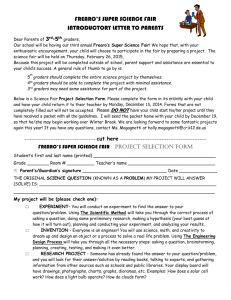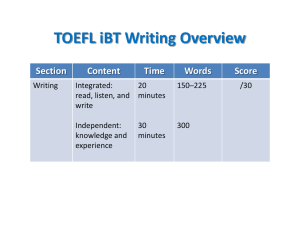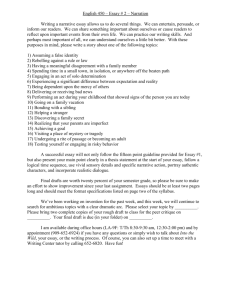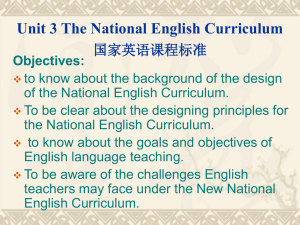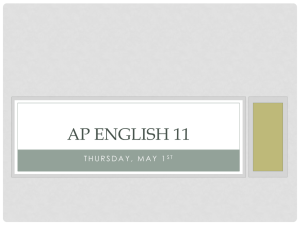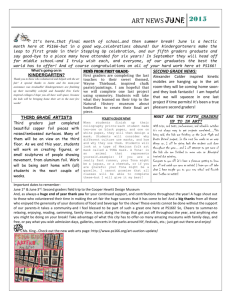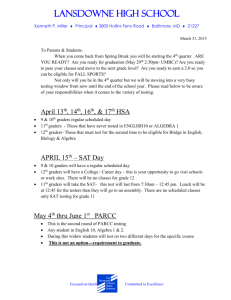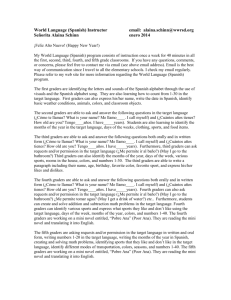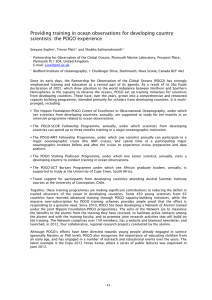Sample 1A Final Exam Prompts
advertisement
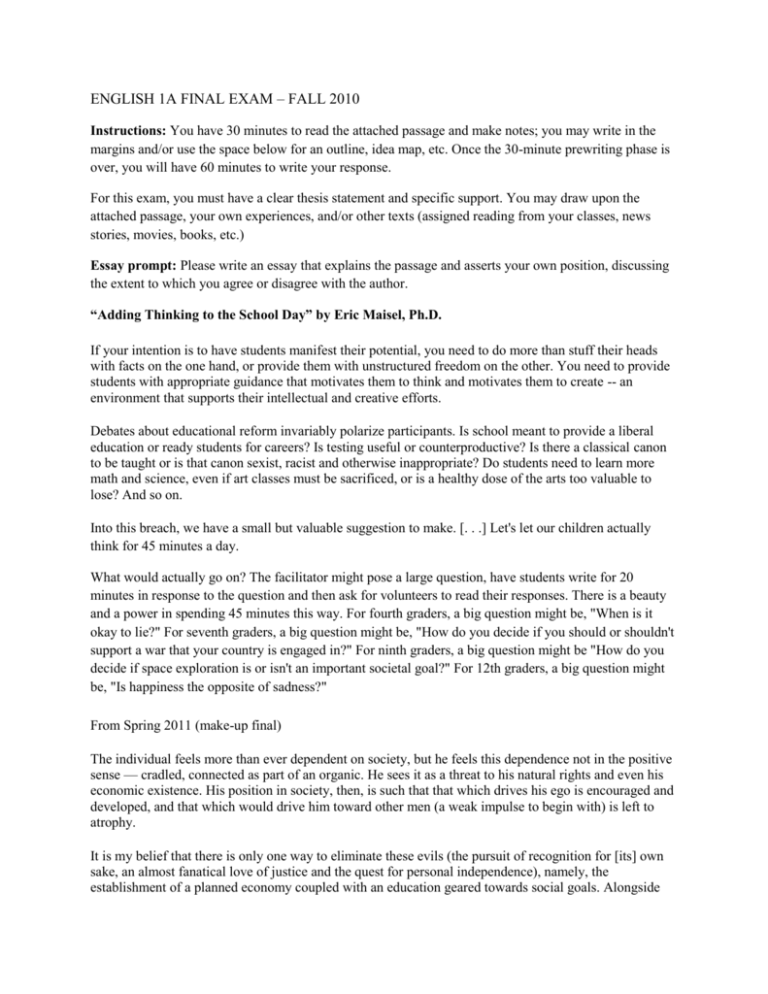
ENGLISH 1A FINAL EXAM – FALL 2010 Instructions: You have 30 minutes to read the attached passage and make notes; you may write in the margins and/or use the space below for an outline, idea map, etc. Once the 30-minute prewriting phase is over, you will have 60 minutes to write your response. For this exam, you must have a clear thesis statement and specific support. You may draw upon the attached passage, your own experiences, and/or other texts (assigned reading from your classes, news stories, movies, books, etc.) Essay prompt: Please write an essay that explains the passage and asserts your own position, discussing the extent to which you agree or disagree with the author. “Adding Thinking to the School Day” by Eric Maisel, Ph.D. If your intention is to have students manifest their potential, you need to do more than stuff their heads with facts on the one hand, or provide them with unstructured freedom on the other. You need to provide students with appropriate guidance that motivates them to think and motivates them to create -- an environment that supports their intellectual and creative efforts. Debates about educational reform invariably polarize participants. Is school meant to provide a liberal education or ready students for careers? Is testing useful or counterproductive? Is there a classical canon to be taught or is that canon sexist, racist and otherwise inappropriate? Do students need to learn more math and science, even if art classes must be sacrificed, or is a healthy dose of the arts too valuable to lose? And so on. Into this breach, we have a small but valuable suggestion to make. [. . .] Let's let our children actually think for 45 minutes a day. What would actually go on? The facilitator might pose a large question, have students write for 20 minutes in response to the question and then ask for volunteers to read their responses. There is a beauty and a power in spending 45 minutes this way. For fourth graders, a big question might be, "When is it okay to lie?" For seventh graders, a big question might be, "How do you decide if you should or shouldn't support a war that your country is engaged in?" For ninth graders, a big question might be "How do you decide if space exploration is or isn't an important societal goal?" For 12th graders, a big question might be, "Is happiness the opposite of sadness?" From Spring 2011 (make-up final) The individual feels more than ever dependent on society, but he feels this dependence not in the positive sense — cradled, connected as part of an organic. He sees it as a threat to his natural rights and even his economic existence. His position in society, then, is such that that which drives his ego is encouraged and developed, and that which would drive him toward other men (a weak impulse to begin with) is left to atrophy. It is my belief that there is only one way to eliminate these evils (the pursuit of recognition for [its] own sake, an almost fanatical love of justice and the quest for personal independence), namely, the establishment of a planned economy coupled with an education geared towards social goals. Alongside the development of individual abilities, the education of the individual aspires to revive an ideal that is geared towards the service of our fellow man, and that needs to take the place of the glorification of power and outer success. --Albert Einstein, from an essay aired circa 1954 From Spring 2008 In a world populated by people who believe that through more and more information, paradise is attainable, the computer scientist is king. But I maintain that all of this is a monumental and dangerous waste of human talent and energy. Imagine what might be accomplished if this talent and energy were turned to philosophy, to theology, to the arts, to imaginative literature or to education? Who knows what we could learn from such people - perhaps why there are wars, and hunger, and homelessness and mental illness and anger. As things stand now, the geniuses of computer technology will give us Star Wars, and tell us that is the answer to nuclear war. They will give us artificial intelligence, and tell us that this is the way to self-knowledge. They will give us instantaneous global communication, and tell us this is the way to mutual understanding. They will give us Virtual Reality and tell us this is the answer to spiritual poverty. But that is only the way of the technician, the fact-mongerer, the information junkie, and the technological idiot. Here is what Henry David Thoreau told us: "All our inventions are but improved means to an unimproved end." Here is what Goethe told us: "One should, each day, try to hear a little song, read a good poem, see a fine picture, and, if it is possible, speak a few reasonable words." And here is what Socrates told us: "The unexamined life is not worth living." And here is what the prophet Micah told us: "What does the Lord require of thee but to do justly, and to love mercy and to walk humbly with thy God?" And I can tell you - if I had the time(although you all know it well enough) - what Confucius, Isaiah, Jesus, Mohammed, the Buddha, Spinoza and Shakespeare told us. It is all the same: There is no escaping from ourselves. The human dilemma is as it has always been, and we solve nothing fundamental by cloaking ourselves in technological glory. Even the humblest cartoon character knows this, and I shall close by quoting the wise old possum named Pogo, created by the cartoonist, Walt Kelley. I commend his words to all the technological utopians and messiahs present. "We have met the enemy," Pogo said, "and he is us." --Neil Postman, from a speech given at a meeting of the German Informatics Society on October 11, 1990. It was titled “INFORMING OURSELVES TO DEATH”
